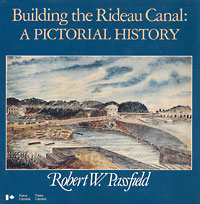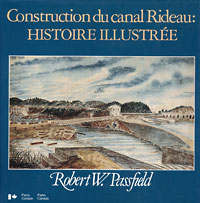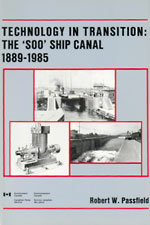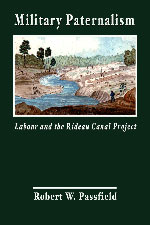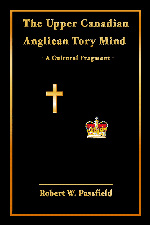
Public Historian
Reprinted in paperback by Fitzhenry & Whiteside (1983); and by the Friends of the Rideau Canal (2003), with permission. Select: Sales Section/Books
Technological innovations are discussed within the context of contemporary North American and European developments during a veritable age of technology in transition. The design evolution of the engineering structures and their operating mechanisms is discussed within a political, economic, and technological context, encompassing a National Policy of economic development. The book comments on the novel uses and adaptations of a newly-established electric power and lighting technologies (D.C. and A.C.); the introduction of new construction materials (steel and concrete) into canal building; and the historical development of the Great Lakes shipping trade (the evolution in the size of the upper lake boats, and the phenomenal growth in shipping traffic volumes on the upper lakes). Reviewed in: Canadian Historical Review, Vol. 71, June 1990, pp. 311-312.; Waterways World (Burton-on-Trent, England), Vol. 18, No. 12, Dec. 1989, p. 53; Journal of Transport History (University of Manchester Press), Vol. 11, No. 2, Sept. 1990, pp. 86-87; Technology and Culture (University of Chicago Press), Vol. 31, No. 4, October 1990, pp. 880-881; IA: Journal of the Society for Industrial Archeology, Vol. 15, No. 2, 1989, pp. 73-74; and The Public Historian (University of California Press), Vol. 14, No. 3, Summer 1992, pp. 107-114.
This book comprises a narrative history of the origins, conduct, and aftermath of an attack on Quebec by a New England fleet under the command of Sir William Phips. It relates what transpired on the Canada Expedition, as recorded by the New England participants who sought to understand, explain, and justify their failed attack, and its devastating outcome, within the framework of the Puritan belief in Providence. It is also the story of the organizational and logistical difficulties overcome, and of the challenges faced, in carrying on an amphibious operation over hundreds of miles of ocean and unchartered river waters in the age of sail; and a tale of the resultant cost in human lives and suffering, and the impact of disease. The last chapter addresses how the concept of sovereignty evolved in the government of the Massachusetts Bay Colony, within the context of the Puritan theology and world view, and how the Crown and colony differed as to 'where sovereignty lay' during a period of political upheaval that immediately preceded the Phips Expedition. Reviewed in: The Northern Mariner, Vol. XXIII, No. 2, April 2013, pp. 195-196. or ebook: www.amazon.com Select: Books > Kindle Books
This book comprises a revisionist history of the labour situation on the Rideau Canal construction project (1826-1832), that rejects the existing Marxist interpretation of class conflict and worker exploitation by the military. In doing so, it examines working conditions on the canal project, takes into account cultural factors in assessing the degree of acculturation of the different immigrant labour groups in adapting to living and working in a North American wilderness environment, and records the paternalism practiced by the Commanding Royal Engineer, Lt. Col. John By, on behalf of the workers on the canal project, and by British military officers in aiding immigrants to settle in the Rideau wilderness. An Appendix presents a critique of the Marxist interpretation of canal labour history during the ‘contractor paternalism’ era, and proffers a cultural values interpretation for military paternalism in Canada, which is based on a comparative analysis of the political culture values of Anglican toryism and Lockean liberalism. Available in paperback, hardcover, and ebook editions. To order: consult www.amazon.ca, or www.amazon.com, or www.amazon.co.uk. Also available at www.chapters.indigo.ca, and books.google.ca where extracts from the book are posted. Search: Robert Passfield
This is a study of the cultural values, principles, and beliefs of the Anglican Tories of the Province of Upper Canada (Ontario) who sought to build and defend a traditional Church-State nation in North America that would be distinct from the neighboring American democratic republic and its secular political culture. The ‘new nation’ was founded as an asylum for the Loyalist refugees of the American Revolution and as a home for British immigrants. It was a constitutional monarchy based on loyalty to the Crown and the British Empire, timeless Christian moral values, and a ‘British national character’ that was to be sustained by the ministrations of the established Church of England, the workings of the balance of the British Constitution, and the teachings of a ‘national system’ of education under the direction of the established Church of England. Today, it is the surviving Tory fragment in the Canadian culture that distinguishes English Canadians from Americans within the all-pervasive Lockean-liberal political culture of North America. Reviewed in: The Dorchester Review, vol. 9, no. 2, Autumn/Winter 2019, 89-92; The Canadian Historical Review, vol. 101, Issue 1, March 2020, 137-139; and The Loyalist Gazette, vol. LVIII, no. 1, Spring 2020, 33-34. Available in hardcover. To order: consult www.rockmillspress.com; or www.amazon.ca/books; or www.amazon.com/books ; or www.barnesandnoblebooks.com
This book develops the theme that ‘ideas influence actions’ through an examination of the response of the governing Anglican Tory gentry of Upper Canada to the major political issues of their day, and it illustrates how that response was informed by the principles, values and beliefs of the Anglican Tory Mind. The study focusses on the critical years, 1812-1840, when the Anglican Tories were defending the cultural values and institutions of the Loyalist Province of Upper Canada in a veritable struggle for survival against an external threat posed by an expansionist United States of America and its democratic republican ideology, and an internal threat posed by democratic radicals, evangelical sectarians, Lockean-liberal secularists, and egalitarian democratic republicans. Within Upper Canada, the disparate ‘outgroups’, were united under the umbrella of a Reform Party that continually attacked the prerogatives of the established Church of England, the balance of the British constitution, and the Anglican administration of the ‘national system’ of education. Through a series of public agitations fostered by the Reform Party, Tory efforts to strengthen the ‘British national character’ of the Province and loyalty to the Crown and unity of Empire were undermined, as well as respect for the traditional social order. In postwar Upper Canada, the Anglican Tories were engaged in a veritable ‘battle of ideas’ which is elaborated on through an analysis of the ideas and character of each of the politicized ‘outgroups’ who were assailing the Tory establishment. As such, this study yields a deeper understanding of the ideological struggles in which the Anglican Tories were engaged in the Loyalist Province of Upper Canada. Today, it is the surviving Tory fragment in the Canadian culture that distinguishes English Canadians from Americans within the all-pervasive Lockean-liberal political culture of North America. Available in hardcover, paperback, and ebook versions. To order: consult www.rockmillspress.com; or www.amazon.ca/books; or www.amazon.com/books
This is a 'present history' of the coronavirus impact on Canada during the Spring of 2020 against the background of a global pandemic. Daily diary entries of commentary and analysis focus on the politics, the evolving science, and the economic costs of the pandemic, with the inclusion of a critique of the approach of the World Health Organization (WHO) and the Canadian Liberal government to the COVID-19 threat, and a concluding Retrospective on the lessons learned. Volume One of the coronavirus diary covers the period from early March through to May 24th, which spans the introduction of the coronavirus into Canada, the wave of coronavirus cases and deaths, and the beginning of a tentative recovery through a planned phased lifting of the provincial lockdowns. The maxim that 'ideas influence actions' is well-illustrated by the response of the globalist Modern liberals of the Canadian federal government to a foreign virus threat. Available in paperback and ebook versions. To order: consult www.amazon.ca/books; or www.amazon.com/books
This is the second volume of a 'present history', written in a diary format, of the impact of the coronavirus pandemic on Canada within the context of a worldwide pandemic. It covers the period from May 25 to July 31, 2020, when the coronavirus appeared to be under control in Canada but was still raging in Third World countries and in the United States. It was a period when provincial lockdowns were being lifted in the hope of initiating an economic recovery, and a return to normal life, amidst warnings of the need to adhere to public health protocols and fears of triggering a 'second wave'. There were new drug treatments for the severely ill, and several candidate vaccines were undergoing clinical trials. In Canada, a political scandal erupted over the granting of a major government contract to the We Charity. What emerges from the diary entries is a damning indictment of the Trudeau Liberal government for its failures in crisis management and uncontrolled expenditures, and its glaring conflicts of interest. These failings and shortcomings were, and are, rooted in the Modern liberal values and principles of the Trudeau government and the hubris of Prime Minister Justin Trudeau. Available in paperback and ebook versions. To order: consult www.amazon.ca/books; or www.amazon.com/books
The commentaries in this book set forth the traditional values, beliefs, and principles of Canadian conservatism within the context of the major moral, political, social, and economic issues of our time, and express a growing unease concerning the future survival of Canada as a sovereign nation-state with a distinct national character and political culture. It is the nation-state that bestows and upholds the political rights and freedoms of a people, that embodies the cultural heritage of a nation, and the history of a people, and that has a duty and responsibility to promote the common good and the national interests of a people. Yet today, Modern liberalism poses a major threat to the culture, heritage, and the very survival of the nation-state. Modern liberalism is a belief system that universalizes the human experience. It embodies a presentist and progressivist perspective on the world that champions universal free trade and open borders (the free movement of peoples), pan-nationalism (the transcending of national loyalties and borders to create a universal state) and post-nationalism (the denial of any continued legitimacy of the traditional nation-state). For Modern liberals 'progress' is equated with the attainment of a universal egalitarian society governed by transnational institutions, such as the United Nations. Domestically, Modern liberals indulge in identity politics (a new form of tribalism), political correctness (a confining of free speech to innocuous subjects), moral relativism (choose your own values), and multiculturalism (which denies that immigrants ought to adopt the values of the country in which they settle and define themselves primarily as citizens of their new country). Moreover, Modern liberals employ an interventionist state to impose their social agenda on a people. Modern liberals regard the history and heritage of a nation as unimportant, if not an impediment to progress towards the achieving of the egalitarian universal state. They have shown a proclivity to undermine the public memory of the history and heritage of the nation by removing heritage symbols and downplaying national public remembrances. The book of Commentaries presents a Tory Conservative perspective on the public issues treated, and the analysis draws heavily on traditional Tory Conservative values and beliefs: viz. a belief in the common good, equality under the law, the rule of law, parliamentary sovereignty, and public morality, and in patriotism, personal accountability, equality of opportunity for all (inclusive of White males), and fiscal responsibility. The views and judgements expressed are such as conservatives of all stripes can readily embrace whatever their differences in emphasis. Available in paperback. Search: www.amazon.ca/books; or www.amazon.com/books, Amazon.co.uk/books, Barnes and Noble books, and Indigo Books Canada.
This is a reprint of an earlier book, Coronavirus Canada (vol. I) with a more accurate, precise and informative title. In early March 2020, the author became intrigued by media accounts of the spread of a novel deadly virus - a coronavirus, but recently designate COVID-19 - that had originated in Wuhan, China. The virus had caused a high number of deaths in Wuhan, had recently spread into Europe, and was beginning to surface in North America. To the author, it appeared that the world was facing the onset of a pandemic. At that point what came to mind was an historical diary -- attributed to Daniel Defoe -- that recorded the impact of the Bubonic plague on London, England, in 1665. In that daily diary, published subsequently as A Journal of the Plague Year (1772), the plague symptoms were recorded, the spread of the plague, the rising death toll, and the efforts of the authorities to deal with the plague in a situation where there was a complete lack of knowledge as to how the plague was propagated. Inspired by the Bubonic plague journal, the author decided to prepare a 'present history' of the threatening COVID pandemic through preparing daily diary entries recording, analyzing, and interpreting the impact of the virus on Canada within a broader world context of developments, and to do so as the pandemic unfolded. Each morning, the author engaged in newspaper research and an extensive Internet search in seeking information on the spread of the virus, the public health situation, and the efforts being made to contain its spread, and the latest public health pronouncements, as well as the daily sickness, deaths, and hospitalization statistics, the financial costs of the pandemic, the social dislocations, and the respective roles of the provincial and federal governments in combatting the pandemic. A particular attention was paid to the financial assistance programs introduced by the federal government in support of workers and companies adversely affected by the pandemic, as well as to advances being made in vaccine research. Each day, a selection was made by the author of several pertinent subjects, followed by an analysis and interpretation of their significance, and the writing up of a diary entry under an appropriate sub-title and the date. The COVID DIARY book entries cover the impact of the first wave of the Covid pandemic from early March 2020 to the end of May 2020, and, hopefully, will serve to preserve a public memory of the character of a severe public health crisis, and the social, political, and economic impact of initial wave of the COVID pandemic on Canada. Available in paperback and ebook versions. To order: consult www.amazon.ca/books; or www.amazon.com/books
Management | Committee of Peers | Professional Activities | CD Books | Blogs |
